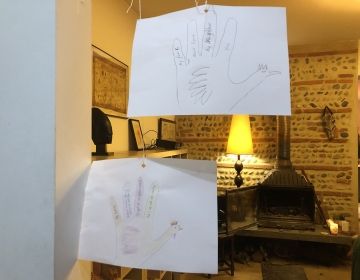On the Other Side of Culture Shock
Sorry that it’s been a while! While studying abroad, it can feel like all your time is filled up; whether it’s your school days that end at 6:00 pm, long meals with your host family, or an hour spent staring at a literature assignment that you don’t quite understand, adjusting to life in a new country keeps you busy. When I do find spare time, it can be tempting to lie in bed and catch up with my friends from the US rather than write. However, I’ve promised myself to update this blog more often, so you’ll see more posts from me soon!
Today is my 7th Sunday in France. While I’m still not used to the multitude of differences, life here is starting to feel more and more normal. Kissing my classmates on the cheek to say hello and greeting my bus drivers has become second nature. Reflecting on the unease I felt when I first got here and comparing it to my carefree attitude now, I realize that the culture I shock I felt has more or less worn off.
Here are some of the things that surprised me the most, and that tend to surprise other Americans:
1. La Bise
Most Americans know that French people kiss each other on the cheek as a greeting, but they don’t consider how big of a part of French life it is. It’s less of a kiss and more a matter of touching cheeks and making a kissing sound. In Toulouse, we kiss twice, once on each side, but this differs by region. La bise is used to greet classmates, friends, family, people who are invited to your house, or people at a house that you are invited to. As a general rule, it’s done with most people you’re introduced to, with the exception of teachers.
2. The Importance of a Greeting
On a related note, saying hello is very important to the French. If you go to class in the morning without stopping to faire la bise with a classmate you consider a friend or even an acquaintance, they might feel offended and confused. While you don’t kiss shop owners, teachers, or bus drivers, the same goes for most everyday situations. When you walk into a classroom, past the bus driver after scanning your card, or into a cafe, it’s important to say a quick bonjour.
3. PDA & Smoking
In the US, kissing your significant while in the middle of a group of friends or smoking a cigarette in the high school courtyard might seem taboo, but in France, both of these things are normal and accepted. Many French teenagers smoke from time to time, and you’ll often see them outside during school breaks.
4. Food Culture
In France, it’s unusual to eat outside of breakfast, lunch, and dinner. Some people will have a snack if they’re home from school or work around 4 or 5, called the gouter. Food is considered more important than it is in the US, and meals take longer and are always eaten together. Lunch breaks are longer, and dessert, bread, and cheese both after lunch and dinner is a common practice in most families. (In the school cafeteria, dessert, bread, and cheese are offered along with the meal.)
5. Length of the School Day
It’s totally normal to finish school at 5 or even 6, and you often have different start and end times depending on the day of the week.
6. Reaction to Exchange Students
At least back at my school, Americans are always excited to meet the new exchange student, and ask them immeditately if they need help and about their home country. French teenagers tend to be more reserved, and prefer for you to approach them first. While they are friendly and open once you talk to them, you might not get the swarm of eager friends you were expecting for your first day in French school.
The cultural differences I’ve noticed are endless, but I’ll reflect on them more in other, more specific posts.
Experiencing culture shock when you arrive in your host country can make you feel scared, homesick, and misunderstood, but I promise that cultural differences soon become a natural part of life. Looking at culture shock from the other side, I’m grateful for it. Seeing the way people live in France has made me more aware of American cultural habits that I never even considered before. While difficult, experiencing two cultures is such an interesting and enriching experience. In addition, don’t feel pressured to understand your host country’s culture before you leave- I remember trying to figure out small cultural details from Google when I ended up picking them up just from living here.
A la prochaine!
Related Posts

Goodbye letter to my class
Last week was my last week of school so I wrote a letter to my class saying goodbye and thank you. This is the version I wrote in French and... keep reading

Celebrating Holidays While Studying Abroad
Thanksgiving was last week, and I wanted to share what it was like for me in France. Since Thanksgiving isn’t a holiday in France I had school, but I celebrated... keep reading

What It's Like Studying Abroad During a Pandemic
I applied to study abroad in France last fall before the coronavirus pandemic. It definitely changed some things and so I wanted to share about my experience being in another... keep reading